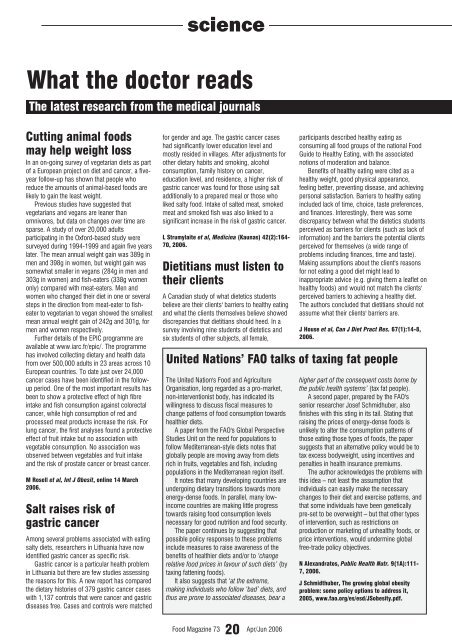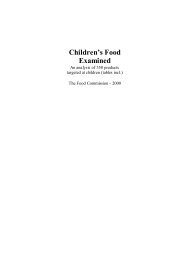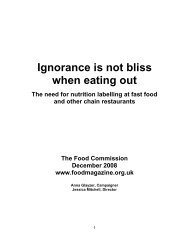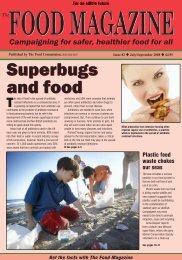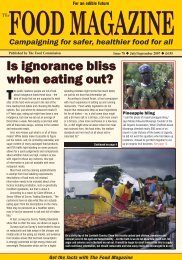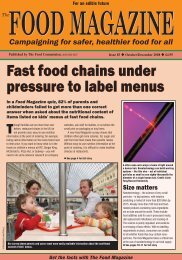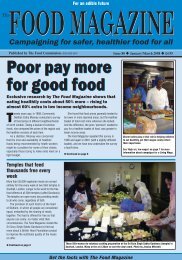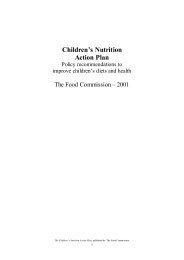Campaigning for safer, healthier food for all - The Food Commission
Campaigning for safer, healthier food for all - The Food Commission
Campaigning for safer, healthier food for all - The Food Commission
You also want an ePaper? Increase the reach of your titles
YUMPU automatically turns print PDFs into web optimized ePapers that Google loves.
science<br />
What the doctor reads<br />
<strong>The</strong> latest research from the medical journals<br />
Cutting animal <strong>food</strong>s<br />
may help weight loss<br />
In an on-going survey of vegetarian diets as part<br />
of a European project on diet and cancer, a fiveyear<br />
follow-up has shown that people who<br />
reduce the amounts of animal-based <strong>food</strong>s are<br />
likely to gain the least weight.<br />
Previous studies have suggested that<br />
vegetarians and vegans are leaner than<br />
omnivores, but data on changes over time are<br />
sparse. A study of over 20,000 adults<br />
participating in the Ox<strong>for</strong>d-based study were<br />
surveyed during 1994-1999 and again five years<br />
later. <strong>The</strong> mean annual weight gain was 389g in<br />
men and 398g in women, but weight gain was<br />
somewhat sm<strong>all</strong>er in vegans (284g in men and<br />
303g in women) and fish-eaters (338g women<br />
only) compared with meat-eaters. Men and<br />
women who changed their diet in one or several<br />
steps in the direction from meat-eater to fisheater<br />
to vegetarian to vegan showed the sm<strong>all</strong>est<br />
mean annual weight gain of 242g and 301g, <strong>for</strong><br />
men and women respectively.<br />
Further details of the EPIC programme are<br />
available at www.iarc.fr/epic/. <strong>The</strong> programme<br />
has involved collecting dietary and health data<br />
from over 500,000 adults in 23 areas across 10<br />
European countries. To date just over 24,000<br />
cancer cases have been identified in the followup<br />
period. One of the most important results has<br />
been to show a protective effect of high fibre<br />
intake and fish consumption against colorectal<br />
cancer, while high consumption of red and<br />
processed meat products increase the risk. For<br />
lung cancer, the first analyses found a protective<br />
effect of fruit intake but no association with<br />
vegetable consumption. No association was<br />
observed between vegetables and fruit intake<br />
and the risk of prostate cancer or breast cancer.<br />
M Rosell et al, Int J Obesit, online 14 March<br />
2006.<br />
Salt raises risk of<br />
gastric cancer<br />
Among several problems associated with eating<br />
salty diets, researchers in Lithuania have now<br />
identified gastric cancer as specific risk.<br />
Gastric cancer is a particular health problem<br />
in Lithuania but there are few studies assessing<br />
the reasons <strong>for</strong> this. A new report has compared<br />
the dietary histories of 379 gastric cancer cases<br />
with 1,137 controls that were cancer and gastric<br />
diseases free. Cases and controls were matched<br />
<strong>for</strong> gender and age. <strong>The</strong> gastric cancer cases<br />
had significantly lower education level and<br />
mostly resided in villages. After adjustments <strong>for</strong><br />
other dietary habits and smoking, alcohol<br />
consumption, family history on cancer,<br />
education level, and residence, a higher risk of<br />
gastric cancer was found <strong>for</strong> those using salt<br />
addition<strong>all</strong>y to a prepared meal or those who<br />
liked salty <strong>food</strong>. Intake of salted meat, smoked<br />
meat and smoked fish was also linked to a<br />
significant increase in the risk of gastric cancer.<br />
L Strumylaite et al, Medicina (Kaunas) 42(2):164-<br />
70, 2006.<br />
Dietitians must listen to<br />
their clients<br />
A Canadian study of what dietetics students<br />
believe are their clients' barriers to healthy eating<br />
and what the clients themselves believe showed<br />
discrepancies that dietitians should heed. In a<br />
survey involving nine students of dietetics and<br />
six students of other subjects, <strong>all</strong> female,<br />
participants described healthy eating as<br />
consuming <strong>all</strong> <strong>food</strong> groups of the national <strong>Food</strong><br />
Guide to Healthy Eating, with the associated<br />
notions of moderation and balance.<br />
Benefits of healthy eating were cited as a<br />
healthy weight, good physical appearance,<br />
feeling better, preventing disease, and achieving<br />
personal satisfaction. Barriers to healthy eating<br />
included lack of time, choice, taste preferences,<br />
and finances. Interestingly, there was some<br />
discrepancy between what the dietetics students<br />
perceived as barriers <strong>for</strong> clients (such as lack of<br />
in<strong>for</strong>mation) and the barriers the potential clients<br />
perceived <strong>for</strong> themselves (a wide range of<br />
problems including finances, time and taste).<br />
Making assumptions about the client's reasons<br />
<strong>for</strong> not eating a good diet might lead to<br />
inappropriate advice (e.g. giving them a leaflet on<br />
healthy <strong>food</strong>s) and would not match the clients'<br />
perceived barriers to achieving a healthy diet.<br />
<strong>The</strong> authors concluded that dietitians should not<br />
assume what their clients' barriers are.<br />
J House et al, Can J Diet Pract Res. 67(1):14-8,<br />
2006.<br />
United Nations’ FAO talks of taxing fat people<br />
<strong>The</strong> United Nation's <strong>Food</strong> and Agriculture<br />
Organisation, long regarded as a pro-market,<br />
non-interventionist body, has indicated its<br />
willingness to discuss fiscal measures to<br />
change patterns of <strong>food</strong> consumption towards<br />
<strong>healthier</strong> diets.<br />
A paper from the FAO's Global Perspective<br />
Studies Unit on the need <strong>for</strong> populations to<br />
follow Mediterranean-style diets notes that<br />
glob<strong>all</strong>y people are moving away from diets<br />
rich in fruits, vegetables and fish, including<br />
populations in the Mediterranean region itself.<br />
It notes that many developing countries are<br />
undergoing dietary transitions towards more<br />
energy-dense <strong>food</strong>s. In par<strong>all</strong>el, many lowincome<br />
countries are making little progress<br />
towards raising <strong>food</strong> consumption levels<br />
necessary <strong>for</strong> good nutrition and <strong>food</strong> security.<br />
<strong>The</strong> paper continues by suggesting that<br />
possible policy responses to these problems<br />
include measures to raise awareness of the<br />
benefits of <strong>healthier</strong> diets and/or to ‘change<br />
relative <strong>food</strong> prices in favour of such diets’ (by<br />
taxing fattening <strong>food</strong>s).<br />
It also suggests that ‘at the extreme,<br />
making individuals who follow ‘bad’ diets, and<br />
thus are prone to associated diseases, bear a<br />
higher part of the consequent costs borne by<br />
the public health systems’ (tax fat people).<br />
A second paper, prepared by the FAO's<br />
senior researcher Josef Schmidhuber, also<br />
finishes with this sting in its tail. Stating that<br />
raising the prices of energy-dense <strong>food</strong>s is<br />
unlikely to alter the consumption patterns of<br />
those eating those types of <strong>food</strong>s, the paper<br />
suggests that an alternative policy would be to<br />
tax excess bodyweight, using incentives and<br />
penalties in health insurance premiums.<br />
<strong>The</strong> author acknowledges the problems with<br />
this idea – not least the assumption that<br />
individuals can easily make the necessary<br />
changes to their diet and exercise patterns, and<br />
that some individuals have been genetic<strong>all</strong>y<br />
pre-set to be overweight – but that other types<br />
of intervention, such as restrictions on<br />
production or marketing of unhealthy <strong>food</strong>s, or<br />
price interventions, would undermine global<br />
free-trade policy objectives.<br />
N Alexandratos, Public Health Nutr. 9(1A):111-<br />
7, 2006.<br />
J Schmidthuber, <strong>The</strong> growing global obesity<br />
problem: some policy options to address it,<br />
2005, www.fao.org/es/esd/JSobesity.pdf.<br />
<strong>Food</strong> Magazine 73 20<br />
Apr/Jun 2006


